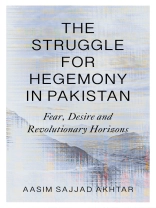The collapse of neoliberal hegemony in the western world following the financial crash of 2007-8 and subsequent rise of right-wing authoritarian personalities has been described as a crisis of ‘the political’ in western societies. But the crisis must be seen as global, rather than focusing on the west alone.
Pakistan is experiencing rapid financialisation and rapacious capture of natural resources, overseen by the country’s military establishment and state bureaucracy. Under their watch, trading and manufacturing interests, property developers and a plethora of mafias have monopolised the provision of basic needs like housing, water and food, whilst also feeding conspicuous consumption by a captive middle-class.
Aasim Sajjad-Akhtar explores neoliberal Pakistan, looking at digital technology in enhancing mass surveillance, commodification and atomisation, as well as resistance to the state and capital. Presenting a new interpretation of our global political-economic moment, he argues for an emancipatory political horizon embodied by the ‘classless’ subject.
Table des matières
Preface and acknowledgements
Introduction: Middle-class hegemonies in theory and history
1. The Integral State
2. Fear and desire
3. The digital lifeworld
4. The classless subject
Epilogue
Notes
Index
A propos de l’auteur
Aasim Sajjad Akhtar is Associate Professor of Political Economy at the National Institute of Pakistan Studies, Quaid-i-Azam University, Pakistan. He is the author of three books, most recently The Politics of Common Sense: State, Society and Culture in Pakistan. He writes for DAWN, one of Pakistan’s leading newspapers.












